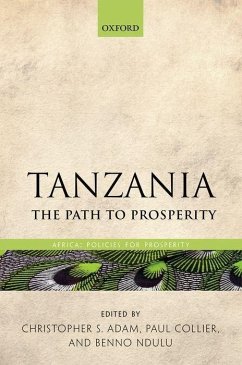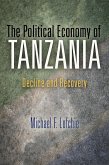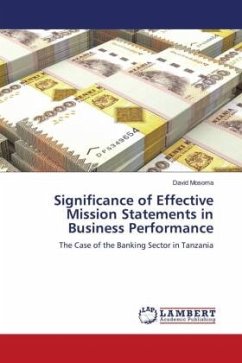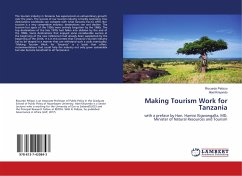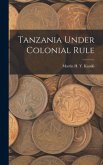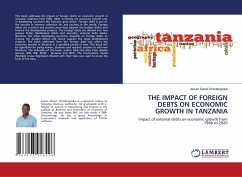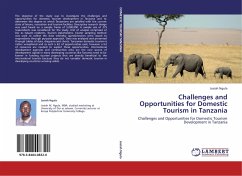Tanzania
The Path to Prosperity
Herausgeber: Adam, Christopher S; Ndulu, Benno; Collier, Paul
Tanzania
The Path to Prosperity
Herausgeber: Adam, Christopher S; Ndulu, Benno; Collier, Paul
- Gebundenes Buch
- Merkliste
- Auf die Merkliste
- Bewerten Bewerten
- Teilen
- Produkt teilen
- Produkterinnerung
- Produkterinnerung
This volume examines key policy challenges facing Tanzania over the coming decades in the areas of agriculture, trade, urbanization, employment, finance, and natural investment.
Andere Kunden interessierten sich auch für
![The Political Economy of Tanzania The Political Economy of Tanzania]() Michael F LofchieThe Political Economy of Tanzania72,99 €
Michael F LofchieThe Political Economy of Tanzania72,99 €![Significance of Effective Mission Statements in Business Performance Significance of Effective Mission Statements in Business Performance]() David MosomaSignificance of Effective Mission Statements in Business Performance27,99 €
David MosomaSignificance of Effective Mission Statements in Business Performance27,99 €![Making Tourism Work for Tanzania Making Tourism Work for Tanzania]() Riccardo PelizzoMaking Tourism Work for Tanzania13,99 €
Riccardo PelizzoMaking Tourism Work for Tanzania13,99 €![Tanzania Under Colonial Rule Tanzania Under Colonial Rule]() Martin H. Y. KanikiTanzania Under Colonial Rule43,99 €
Martin H. Y. KanikiTanzania Under Colonial Rule43,99 €![Local contracting firms in natural gas sector in Tanzania Local contracting firms in natural gas sector in Tanzania]() Eng. Edward William MkendaLocal contracting firms in natural gas sector in Tanzania36,99 €
Eng. Edward William MkendaLocal contracting firms in natural gas sector in Tanzania36,99 €![THE IMPACT OF FOREIGN DEBTS ON ECONOMIC GROWTH IN TANZANIA THE IMPACT OF FOREIGN DEBTS ON ECONOMIC GROWTH IN TANZANIA]() James Daniel ChindengwikeTHE IMPACT OF FOREIGN DEBTS ON ECONOMIC GROWTH IN TANZANIA26,99 €
James Daniel ChindengwikeTHE IMPACT OF FOREIGN DEBTS ON ECONOMIC GROWTH IN TANZANIA26,99 €![Challenges and Opportunities for Domestic Tourism in Tanzania Challenges and Opportunities for Domestic Tourism in Tanzania]() Josiah NgulaChallenges and Opportunities for Domestic Tourism in Tanzania32,99 €
Josiah NgulaChallenges and Opportunities for Domestic Tourism in Tanzania32,99 €-
-
-
This volume examines key policy challenges facing Tanzania over the coming decades in the areas of agriculture, trade, urbanization, employment, finance, and natural investment.
Produktdetails
- Produktdetails
- Verlag: Oxford University Press, USA
- Seitenzahl: 330
- Erscheinungstermin: 15. März 2017
- Englisch
- Abmessung: 236mm x 155mm x 25mm
- Gewicht: 590g
- ISBN-13: 9780198704812
- ISBN-10: 019870481X
- Artikelnr.: 47867303
- Verlag: Oxford University Press, USA
- Seitenzahl: 330
- Erscheinungstermin: 15. März 2017
- Englisch
- Abmessung: 236mm x 155mm x 25mm
- Gewicht: 590g
- ISBN-13: 9780198704812
- ISBN-10: 019870481X
- Artikelnr.: 47867303
Christopher Adam is Professor of Development Economics at the University of Oxford, UK and Research Associate of the Centre for the Study of African Economies. He is currently the Lead Academic for Tanzania for the International Growth Centre (IGC) and Visiting Scholar at the IMF, working on the DFID-IMF Macroeconomic Research Programme on Low-Income Countries. He studied economics at the University of St Andrews and Nuffield College, Oxford. His academic research focuses on the macroeconomics of low-income countries, particularly those of sub-Saharan Africa. Paul Collier is a Professor of Economics and Public Policy at the Blavatnik School of Government and Director of the Centre for the Study of African Economies. He took a five year Public Service leave, 1998-2003, during which he was Director of the Research Development Department of the World Bank. He is also a Professeur invité at Sciences Po, and at Paris 1. In 2008 he was awarded a CBE 'for services to scholarship and development'. He is the author of The Bottom Billion, which in 2008 won the Lionel Gelber, Arthur Ross and Corine prizes and in May 2009 was the joint winner of the Estoril Global Issues Distinguished Book prize. He is Advisor to the Strategy and Policy Department of the IMF and advisor to the Africa Region of the World Bank. He writes for the Independent, the New York Times, the Financial Times, the Wall Street Journal, and the Washington Post. Benno Ndulu was appointed Governor of the Central Bank of Tanzania in January 2008. He started his career at the University of Dar es Salaam in the early 1980s before joining the World Bank as a Lead Economist. He is best known for his involvement in setting up and developing one of the most effective research and training networks in Africa, the African Economic Research Consortium. He received an honorary doctorate from the International Institute of Social Studies (ISS) in The Hague in 1997 in recognition of his contributions to Capacity Building and Research on Africa. Following his Ph.D. degree in economics from Northwestern University in Evanston, Illinois, he taught economics and published widely on growth, adjustment, governance and trade.
* 1: Christopher Adam, Paul Collier, and Benno Ndulu: Introduction:
Productivity, Organizations, and Connectivity
* 2: Benno Ndulu and Nkunde Mwase: The Building Blocks towards
Tanzania's Prosperity: Lessons from Looking Back and The Way Forward
* 3: Mark Henstridge and Dennis Rweyemamu: Managing Hydrocarbon
Resources
* 4: Paul Collier and Patricia Jones: Transforming Dar es Salaam into a
City that Works
* 5: Charles Kunaka, Olivier Hartmann, Gaël Raballand, and Rukia
Shamte: Trade, Logistics Infrastructure, and Regional Integration
* 6: Douglas Gollin and Radhika Goyal: Agricultural Transformation in
Tanzania: Linking Rural to Urban through Domestic Value Chains
* 7: Margaret McMillan, John Page, and Samuel Wangwe: Unlocking
Tanzania's Manufacturing Potential
* 8: Mahjabeen Haji and Jacques Morrisset: Tanzania: Building a Skills
Agenda towards Productive Employment
* 9: Channing Arndt, Vincent Leyaro, Kristin Mahrt, and Finn Tarp:
Growth and Poverty: A Pragmatic Assessment and Future Prospects
* 10: Christopher Adam, Jehovaness Aikaeli, and Anne Laski: Public
Investment and Fiscal Reforms
* 11: Pantaleo J. Kessy, Stephen A. O'Connell, and Johnson Nyella:
Monetary Policy in Tanzania: Accomplishments and the Road Ahead
* 12: Natu Mwamba, Nangi Massawe, and Kennedy Komba: Financial Sector
Development and Financial Inclusion
Productivity, Organizations, and Connectivity
* 2: Benno Ndulu and Nkunde Mwase: The Building Blocks towards
Tanzania's Prosperity: Lessons from Looking Back and The Way Forward
* 3: Mark Henstridge and Dennis Rweyemamu: Managing Hydrocarbon
Resources
* 4: Paul Collier and Patricia Jones: Transforming Dar es Salaam into a
City that Works
* 5: Charles Kunaka, Olivier Hartmann, Gaël Raballand, and Rukia
Shamte: Trade, Logistics Infrastructure, and Regional Integration
* 6: Douglas Gollin and Radhika Goyal: Agricultural Transformation in
Tanzania: Linking Rural to Urban through Domestic Value Chains
* 7: Margaret McMillan, John Page, and Samuel Wangwe: Unlocking
Tanzania's Manufacturing Potential
* 8: Mahjabeen Haji and Jacques Morrisset: Tanzania: Building a Skills
Agenda towards Productive Employment
* 9: Channing Arndt, Vincent Leyaro, Kristin Mahrt, and Finn Tarp:
Growth and Poverty: A Pragmatic Assessment and Future Prospects
* 10: Christopher Adam, Jehovaness Aikaeli, and Anne Laski: Public
Investment and Fiscal Reforms
* 11: Pantaleo J. Kessy, Stephen A. O'Connell, and Johnson Nyella:
Monetary Policy in Tanzania: Accomplishments and the Road Ahead
* 12: Natu Mwamba, Nangi Massawe, and Kennedy Komba: Financial Sector
Development and Financial Inclusion
* 1: Christopher Adam, Paul Collier, and Benno Ndulu: Introduction:
Productivity, Organizations, and Connectivity
* 2: Benno Ndulu and Nkunde Mwase: The Building Blocks towards
Tanzania's Prosperity: Lessons from Looking Back and The Way Forward
* 3: Mark Henstridge and Dennis Rweyemamu: Managing Hydrocarbon
Resources
* 4: Paul Collier and Patricia Jones: Transforming Dar es Salaam into a
City that Works
* 5: Charles Kunaka, Olivier Hartmann, Gaël Raballand, and Rukia
Shamte: Trade, Logistics Infrastructure, and Regional Integration
* 6: Douglas Gollin and Radhika Goyal: Agricultural Transformation in
Tanzania: Linking Rural to Urban through Domestic Value Chains
* 7: Margaret McMillan, John Page, and Samuel Wangwe: Unlocking
Tanzania's Manufacturing Potential
* 8: Mahjabeen Haji and Jacques Morrisset: Tanzania: Building a Skills
Agenda towards Productive Employment
* 9: Channing Arndt, Vincent Leyaro, Kristin Mahrt, and Finn Tarp:
Growth and Poverty: A Pragmatic Assessment and Future Prospects
* 10: Christopher Adam, Jehovaness Aikaeli, and Anne Laski: Public
Investment and Fiscal Reforms
* 11: Pantaleo J. Kessy, Stephen A. O'Connell, and Johnson Nyella:
Monetary Policy in Tanzania: Accomplishments and the Road Ahead
* 12: Natu Mwamba, Nangi Massawe, and Kennedy Komba: Financial Sector
Development and Financial Inclusion
Productivity, Organizations, and Connectivity
* 2: Benno Ndulu and Nkunde Mwase: The Building Blocks towards
Tanzania's Prosperity: Lessons from Looking Back and The Way Forward
* 3: Mark Henstridge and Dennis Rweyemamu: Managing Hydrocarbon
Resources
* 4: Paul Collier and Patricia Jones: Transforming Dar es Salaam into a
City that Works
* 5: Charles Kunaka, Olivier Hartmann, Gaël Raballand, and Rukia
Shamte: Trade, Logistics Infrastructure, and Regional Integration
* 6: Douglas Gollin and Radhika Goyal: Agricultural Transformation in
Tanzania: Linking Rural to Urban through Domestic Value Chains
* 7: Margaret McMillan, John Page, and Samuel Wangwe: Unlocking
Tanzania's Manufacturing Potential
* 8: Mahjabeen Haji and Jacques Morrisset: Tanzania: Building a Skills
Agenda towards Productive Employment
* 9: Channing Arndt, Vincent Leyaro, Kristin Mahrt, and Finn Tarp:
Growth and Poverty: A Pragmatic Assessment and Future Prospects
* 10: Christopher Adam, Jehovaness Aikaeli, and Anne Laski: Public
Investment and Fiscal Reforms
* 11: Pantaleo J. Kessy, Stephen A. O'Connell, and Johnson Nyella:
Monetary Policy in Tanzania: Accomplishments and the Road Ahead
* 12: Natu Mwamba, Nangi Massawe, and Kennedy Komba: Financial Sector
Development and Financial Inclusion

